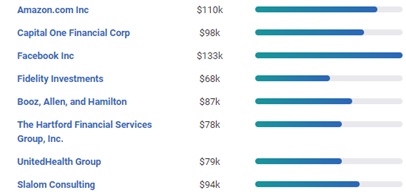Demand for data science professionals is huge, and the manner it’s growing, 2021 will see an even bigger dearth of data engineers and scientists. The primary reason for the scarcity of data engineers across the globe is the extensive skillset the role demands for, and a very few have got them. Top companies across industries are constantly on a lookout for skilled data engineers, but there hardly exist any that really fulfils the skill needs of the recruiters.
In the US, the situation is the worst when it comes to shortage of data science talent. Across cities in the US, companies are failing to fill in the data science job vacancies. To be specific, New York has a shortage of 34,032 data science professionals, San Francisco Bay Area lacking a data science talent pool of 31,798, and Los Angeles experiencing a shortfall of 12,251.
As per Google Cloud Training Department – With market for AI and ML (machine learning) powered solutions forecasted to grow to a whopping USD 1.2 billion by 2023, It’s vital for companies that have adopted data analytics into their processes, to fill in data science talent for the future needs. A couple of years earlier, data engineers were only needed to work with distributed systems & Java to leverage HadoopMapReduce, but now, they are required to apply ML, AI, and BI (business intelligence) skills too, to analyse data in a more effective manner.
As a matter of fact, more data engineers are needed than data scientists to manage integrated data structures and high-volume data pipelines at companies across industry sectors.
Abundance of Employment Opportunities for Aspirants

Data science engineers are heavily required across business sectors worldwide. Most companies that have adopted data analytics in their business processes are looking to double the size of their team of big data engineers within their respective organizations.
According to the DICE 2020 Tech Job Report – Data engineer was the most rapidly growing job role last year, thereby registering a tremendous growth rate of 50%. The same report revealed that it took an average of 46 days to fill in a data engineering job role in 2019, whereas in 2020, the expected time filling a data engineer role will be even longer.
Factors Contributing to the Dearth of Data Engineers
There exist a plethora of reasons why big data engineers are hard to find. A few of them comprise:
- Knowledge in Multiple Subject Disciplines: Data science professionals are needed to have a general understanding of multiple subject disciplines such as maths, physics, statistics, and economics, among a few others.
- Extensive Skillset Required: It’s not a field of profession wherein you can fake it until you make it. Here, you will get exposed right at the time of the job interview. Only dedicated self-study or an industry-relevant data science certification can help you prepare for the job role. If you have a data science specific college degree, then you do have an edge.
- Data Engineering is Evolving at an Unprecedented Pace: It is one unique field of profession that has evolved unprecedentedly off late. As a result, skill-needs have multiplied even faster, with now, added skillset to bag a data engineer role comprises familiarity with ETL, Hadoop, and Apache Spark.
Data Engineering Aspirants Lack Guidance
Another big reason for scarcity of data engineers worldwide is the absence of adequate guidance for big data industry aspirants. Data science is a broad subject, and the aspirants usually try to learn everything associated with the said industry domain. This results in making them jack of all trades, but master of none. On the other hand, businesses are desperately seeking big data experts who are adept at analysing a particular kind of data.
And therefore, it becomes crucial, what data science skills you are learning, and what will be their use in the near future for your long-term career. Are those skills industry-relevant, and what companies are hiring for the kind of big data skills you are training into? Ask yourself these questions, before you start preparing for a specific data science role that is open in the job markets. Even when considering professional data science credentialing programs to enrol into, keep long-term career goals and target companies always in mind. Cheers!




















